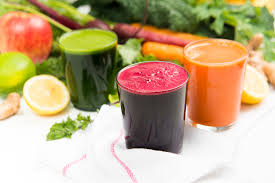
This heart healthy juice recipe consist of a combination of vitamins, enzymes, minerals, and phytonutrients that aid in balancing cholesterol levels, blood pressure, and vascular performance – ultimately helping to reduce your risk of heart attack, stroke, and Heart Disease. For even more health benefits, keep some of the pulp from the fruits and vegetables in these juices. Some of these fibers help enhance the break down the LDL and reduce blood pressure, as well as maximize any digestion benefits. You can also add ginger to any of these recipes for an extra kick and boost in vascular health. Ginger is a soothing herb and can help to enhance blood flow by relaxing the muscles surrounding blood vessels and preventing blood clots.
Just Beet It!
- 1 Beet Root
- 1 lg. Tomato
- 3-4 Celery stalks
- 3-4 Kale leaves
Beetroot
Normalizes blood pressure and improves circulation. It is rich in Nitrate, known to reduce blood pressure by producing nitric oxide that widens blood vessels and arteries, and folate, which also protects against high blood pressure, as well as aid the production of red blood cells. Its levels of carotenoids and flavonoids help maintain healthy cholesterol by stopping LDL from oxidizing and building up in the arteries.
- Beetroot also contains silica, potassium, iron, manganese, and beta-carotene
- Add beetroot to any antioxidant, bone protection, and anti-aging juice recipes
Tomato
High levels of antioxidants and lycopene play a role in blood circulation, lowering blood pressure, and stroke prevention. Studies have found that the lycopene and niacin found in tomatoes reduce the presence of oxidized LDL (bad cholesterol) that may contribute to the formation of plaque along arterial walls, while helping to increase HDL levels (good cholesterol).
- Tomatoes are also rich in vitamin C, vitamin A, vitamin K, potassium, and folate
- Add tomato to any antioxidant, bone protection, eye protection, and anti-aging juice recipes
Celery
Prevents risk of high blood pressure helps equalize the body’s pH levels. Research has found that the phytonutrient, phthalide helps relax the muscles surrounding blood vessels, allowing the vessels to expand and lower blood pressure. Enzymes and fibers (pulp) in celery also enhance bile acid secretion, which helps remove cholesterol from the body and equalize pH levels.
- Reduces water retention and relaxes muscles
- Add celery to any antioxidant, anti-inflammation, and digestion juice recipes
Kale
Lowers cholesterol, improves metabolism and blood sugar levels, and supports overall cardiovascular health. Often referred to as the “powerhouse” of all superfoods, kale is rich in several vitamins, minerals, and phytonutrients essential to cardiac health (as well as several other diseases) like lutein, folate, potassium, omega-3 fatty acids, vitamin K, and chlorophyll. Studies have shown that lutein may play a significant role in the prevention of atherosclerosis – hardening of arteries – and reduce the risk of heart attack and stroke. This carotenoid is also helpful in avoiding clogged arteries and carotid artery thickness. Because kale is rich in vitamin C, it helps maintain healthy blood sugar levels by boosting metabolism and keeping the body hydrated.
- Kale does wonders for bone, skin, and eye health, as well as digestion (as long as you keep most of those pulpy fibers!)
- Research has found that cancer-preventing antioxidants in kale have a specifically beneficial role in the prevention of colon cancer, breast cancer, prostate cancer, and ovarian cancer.